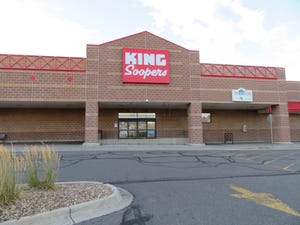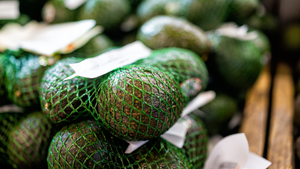HIGH-PRESSURE SALESMANHIGH-PRESSURE SALESMAN
CHANDLER, Ariz. -- Bill Romley Jr. had a tough time selling upper management on pressurized banana ripening rooms.The perishables warehouse manager and assistant produce buyer at Bashas' Markets here knew pressurized rooms could save the company about $250 in labor fees per truckload of bananas. That's an annual savings of about $130,000 for a company that sells 10 trailer shipments of bananas weekly
July 18, 1994
TONY SPLEEN
CHANDLER, Ariz. -- Bill Romley Jr. had a tough time selling upper management on pressurized banana ripening rooms.
The perishables warehouse manager and assistant produce buyer at Bashas' Markets here knew pressurized rooms could save the company about $250 in labor fees per truckload of bananas. That's an annual savings of about $130,000 for a company that sells 10 trailer shipments of bananas weekly through its 68 stores and a variety of wholesale outlets. But labor savings alone weren't enough to convince management.
The cost of the pressurized rooms was projected to be more than double that of traditional ripening rooms.
So how did Romley get his company to cough up more than $600,000 for the 10 pressurized rooms that were included in Bashas' new refrigerated warehouse, completed a little more
than two years ago?
"I won't say it was easy," he said with a smile. "But the proposal was put together well and it was well presented. Upper management had a lot of faith in us. They certainly haven't regretted it."
Romley did his research before he tried to sell his plan. He traveled throughout Arizona and California visiting wholesalers and retailers who were using pressurized ripening rooms to find out what made them successful. Two retailers, the southern California division of Smith's Food & Drug Centers, Salt Lake City, and Ralphs Grocery Co., Compton, Calif., gave him much of the information he needed to convince his company to make the investment.
In addition to the labor savings, Romley was able to demonstrate to management that banana ripening rooms would help increase banana sales and dramatically reduce shrink. Most importantly, he proved that their customers would benefit by receiving consistently ripened bananas with better shelf life at no additional cost.
Because of all the benefits, Romley said the rooms -- which accounted for about 10% of the total cost of the refrigerated warehouse -- paid for themselves within the first year. He couldn't name one disadvantage to operating pressurized ripening rooms.
Bashas' experience with the rooms mirrors that of many medium- and large-sized retailers and wholesalers across the country who have invested in the updated technology.
Bananas are the top produce item for most retailers year-round in terms of sales and volume. Pressurized rooms have helped retailers capitalize even further on bananas' No. 1 status.
At Bashas', bananas account for about 6% of produce sales, the top seller in the department, according to Romley. Since the company started using the pressurized ripening rooms, banana sales have increased about 10%.
"We attribute the increase to better looking bananas and bananas that hold up better," Romley told SN during a recent visit to the warehouse. "We put out more appealing fruit." Once again, Romley gave the credit to the pressurized rooms.
Each of the new rooms at Bashas' holds up to 24 pallets of 48 boxes, or a maximum of 1,152 boxes of bananas. Once the pallets are loaded into the rooms, the boxes of bananas are covered with a plastic tarp, the humidity is adjusted, the temperature is set and giant exhaust fans pull the air through the room creating enough pressure to draw the air through the boxes and around each banana.
"Within an hour of setting the temp-
erature, you have the bananas cooled down or warmed up to the desired temperature," Romley said. The result is even ripening and consistent color throughout all the boxes on the pallet.
"If you're trying to send a color 4 (between green-tip and ripe) to your stores, then you know that all 1,152 boxes are going to come out of that room at the same color and that all of your customers are going to get the same color fruit."
In traditional ripening rooms, which rely solely on temperature controls to turn bananas from green to yellow, there is no pressure to create airflow throughout each box. What often happens, as a result, is inconsistent cooling down or warming up of fruit.
"In the old rooms, you'd blow air around the outside of the boxes," said Romley. "You'd have hot spots or cold spots that didn't get the air flow. As a result, you could get three or four different colors of bananas on a pallet, or you'd ruin some bananas."
Because the internal temperature of each banana can be controlled within one degree, Romley said, another benefit of the pressurized rooms is that the ripening process can be manipulated so that ripened fruit is ready when the retailer needs it.
"You can hold the bananas at 58 degrees," the ideal temperature to suspend ripening, he said. "When you want to ripen them, you can raise the temperature above 60 degrees to open the pores of the fruit and add ethylene gas." After 24 hours, Romley cuts back the temperature to hold the fruit at 58 degrees and to interrupt the ripening process before shipping the bananas to the stores. Bringing the internal temperature back to 58 degrees helps extend shelf life "by a few extra days," Romley said.
In addition to providing consistent color, pressurized rooms generally produce bananas with fewer bruises. The reason: Bananas ripened in pressurized rooms require less handling.
"Handling is a banana's worst enemy," said Romley. With the new rooms, he said, "bananas come off of the boat 48 cases per pallet. They go onto a truck on the same pallet. They go into the ripening rooms on that pallet and get shipped out to the stores on the very same pallet."
Because the airflow in the pressurized rooms is sufficient to regulate the internal temperature of bananas in boxes stacked side-by-side, there is no need to restack bananas.
With traditional ripening rooms, however, bananas are typically restacked to 25 cases per pallet to create space between boxes and to help regulate the temperature of the bananas, a practice Romley said is not only inefficient but rarely helps to control internal temperature.
This practice has the potential to bruise many bananas and increase shrink. It also adds labor and means that more space, a valuable commodity in a distribution center, is needed to accommodate the same amount of bananas that can be held in a pressurized room. A comparable-sized traditional room can hold about 600 cases of bananas, a little more than half the amount that will fit in a pressurized room.
These added costs are wasted, said Romley. "Any company that operates a warehouse should use [pressurized rooms] to ripen bananas. Yes, they are a much greater investment, but you get a lot more for your money in utilizing the square footage of your warehouse and taking care of your customers properly."
Romley said he has used the rooms on occasion to ripen tomatoes and avocados, but for the most part he can't spare the rooms for other commodities.
In addition to serving Bashas' 68 stores, the warehouse also provides bananas to area wholesalers and businesses. About 25% of the 26 million pounds of bananas that go through the ripening rooms each year are sold to outside customers.
"If your business only uses 300 cases of bananas a week, you can't ripen them yourself and expect to get consistent color," Romley said. "So we found a little niche where we can make a little extra money."
Bashas' is "growing by leaps and bounds," said Romley, and the company plans to open another five stores this year. So how long will the current rooms meet the company's needs? "We built them to meet our needs five years into the future," Romley said. "So we're OK for another two years. Then we'll need to expand."
About the Author
You May Also Like




